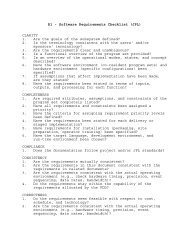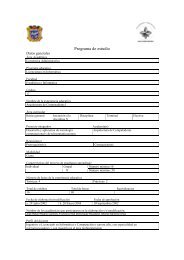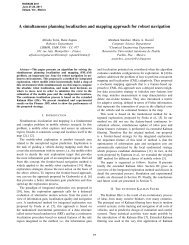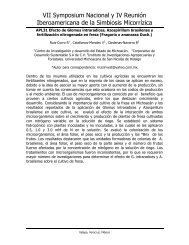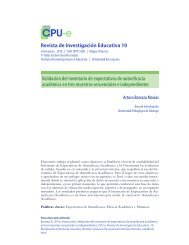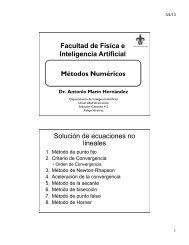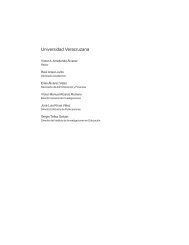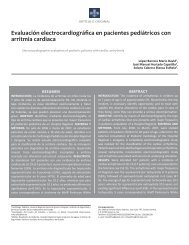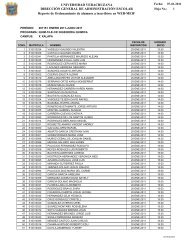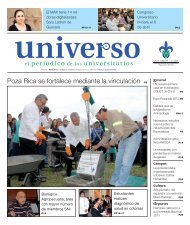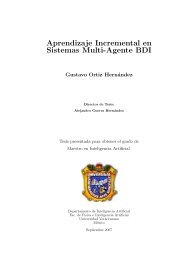Suplemento 2 Vol 8 No 1.indd - Universidad Veracruzana
Suplemento 2 Vol 8 No 1.indd - Universidad Veracruzana
Suplemento 2 Vol 8 No 1.indd - Universidad Veracruzana
Create successful ePaper yourself
Turn your PDF publications into a flip-book with our unique Google optimized e-Paper software.
compensatorios. Cambios semejantes, de disminución en<br />
el metabolismo cerebral en sistemas involucrados en la<br />
activación cerebral e incrementos metabólicos en regiones<br />
involucradas en las tareas evaluadas se han observado en<br />
estudios con resonancia magnética funcional.<br />
Aunque los cambios, al menos después de 38 horas<br />
de privación de sueño son reversibles y el cerebro tiene<br />
todavía recursos para compensarlos, preocupa la existencia<br />
actual de una tendencia a disminuir las horas de sueño en<br />
las sociedades urbanas. Lo cierto es que la falta de sueño<br />
provoca un aumento en los errores que se cometen en la<br />
vida real al ejecutar tareas que demandan atención y toma<br />
de decisiones, así como en la velocidad para corregirlos 7 , tal<br />
y como ocurre al manejar vehículos 8 y durante las guardias<br />
médicas prolongadas 9 . Cuando la falta de sueño se suma<br />
a cantidades moderadas de alcohol, tan bajas (0.010 g/100<br />
ml de sangre) como las que se ingieren habitualmente en<br />
eventos sociales, se cometen más errores en simuladores<br />
de manejo de vehículos 10 . La falta de conciencia del<br />
error cometido es especialmente evidente en jóvenes y<br />
en hombres adultos que sobrevaloran sus capacidades, en<br />
comparación con las mujeres que tienen mejor conciencia<br />
de la limitación de sus capacidades y evitan manejar 11 .<br />
56<br />
BIBLIOGRAFÍA<br />
1. Corsi-Cabrera, M. Funcionamiento cortical cuando<br />
el sueño no ha sido suficiente. En: Trastornos del<br />
Dormir. M.Valencia, R. Salín, R. Pérez. McGraw-<br />
Hill Interamericana, 2000, pp 109-126.<br />
2. Corsi-Cabrera M, Ramos J, Arce C, y cols. Changes<br />
in the waking EEG as a consequence of sleep and<br />
sleep deprivation. Sleep 1992;15:550-555.<br />
3. Ugalde, E., Corsi-Cabrera, M., Juárez, J., y cols.<br />
Waking electroencephalogram activity as a<br />
consequence of sleep and total sleep deprivation in<br />
Revista Médica<br />
Autor responsable:<br />
Dra. María Corsi Cabrera<br />
Facultad de Psicología, Posgrado<br />
Av. <strong>Universidad</strong> 3004<br />
México, D.F. 04510<br />
Teléfono 56 22 22 51<br />
corsi@servidor.unam.mx<br />
the rat. Sleep, 1994;17:226-230.<br />
4. Lorenzo Y, Ramos J, Arce C, y cols.. Effect of total<br />
sleep deprivation on reaction time and waking<br />
EEG activity in man. Sleep 1995;18:346-54.<br />
5. Corsi-Cabrera M, Arce C Del-Río-Portilla Y, y<br />
cols. Amplitude reduction in visual event related<br />
potentials as a function of sleep deprivation. Sleep,<br />
1999, 22:181-191.<br />
6. Corsi-Cabrera M, Sánchez AI, Del-Río-Portilla Y,<br />
y cols. Effects of 38 h of total sleep deprivation on<br />
the waking EEG in women: sex differences. I. J.<br />
Psychophysiol., 2003; 50: 213-224.<br />
7. Van Dongen HPA, Maislin G, Mullington JM, y<br />
cols. The cumulative cost of additional wakefulness:<br />
dose-response effects on neurobehavioral functions<br />
and sleep physiology from chronic sleep restriction<br />
and total sleep deprivation. Sleep, 2003; 26: 117-<br />
126.<br />
8. Tsai LL, Young HY, Hsieh S, y cols. Impairment<br />
of error monitoring following sleep deprivation.<br />
Sleep 2005;28:707-713.<br />
9. Howard SK, Gaba DM, Rosekind MR, y cols.<br />
The risks and implications of excessive daytime<br />
sleepiness in resident physicians. Acad Med.<br />
2002;77:1019-25.<br />
10. Banks S, Catcheside P, Lack L, y cols. Low levels<br />
of alcohol impair driving simulator performance<br />
and reduce perception of crash risk in partially<br />
sleep deprived subjects. Sleep, 2004;27:1063-<br />
1067.<br />
11. Barret PR, Horne JA, Reyner LA. Sleepiness<br />
combined with low alcohol intake in women<br />
drivers: greater impairment but better perception<br />
than men? Sleep, 2004; 27: 1057-1062.<br />
Revista Médica de la <strong>Universidad</strong> <strong>Veracruzana</strong> / <strong>Suplemento</strong> 2 <strong>Vol</strong>. 8 núm. 1, Enero - Junio 2008



